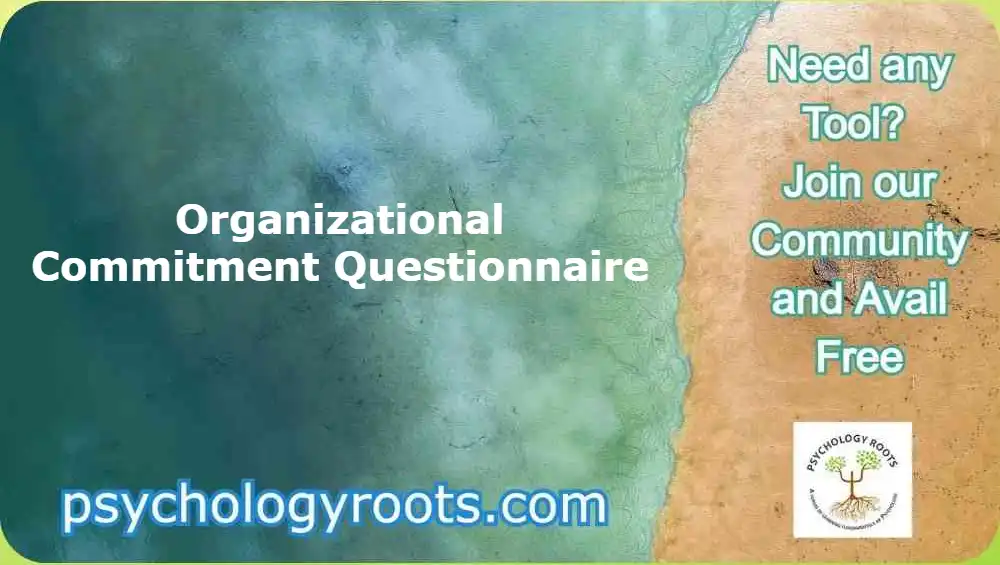Table of Contents
Organizational Commitment Questionnaire
Here in this post, we are sharing the “Organizational Commitment Questionnaire”. You can read psychometric and Author information. We have thousands of Scales and questionnaires in our collection (See Scales and Questionnaires). You can demand us any scale and questionnaires related to psychology through our community, and we will provide you with a short time. Keep visiting Psychology Roots.
About Organizational Commitment Questionnaire
Scale Name
Organizational Commitment Questionnaire
Author Details
Translation Availability

Background/Description
Three facets Organizational Commitment Questionnaire (Allen & Meyer, 1990) was modified leaving the 19-item measure anchored with a 5-point Likert format. The component of affective commitment as the emotion-based view of organizational commitment was retained in terms of its individual items. Continuance component as a perceived cost of leaving an organization was modified by omitting item nos. 10 “I am not concerned about what might happen if I left (name of organization) without having another position lined up”, 13 “It wouldn’t be too costly for me to leave (name of organization) now”, and 15 “one of the serious consequences of leaving (name of organization) would be the scarcity of available alternatives”. The normative component as feelings of moral obligations or responsibilities was also retained in terms of its indicators.
The Organizational Commitment Questionnaire (OCQ), developed by Allen and Meyer (1990), is a widely used tool for assessing employees’ commitment to their organization. The questionnaire measures organizational commitment as a multi-dimensional construct, encompassing three components:
- Affective Commitment: Emotional attachment and identification with the organization.
- Continuance Commitment: Awareness of the costs associated with leaving the organization.
- Normative Commitment: Feeling of obligation to remain with the organization.
The OCQ consists of items designed to capture employees’ perceptions and feelings related to their bond with their organization. Each item is rated on a seven-point Likert scale, ranging from strongly disagree (1) to strongly agree (5).
The scale’s theoretical foundation is rooted in the belief that organizational commitment reflects both an individual’s emotional and rational connection to their workplace, influencing behavior such as performance, turnover, and organizational citizenship.
Administration, Scoring and Interpretation
- Obtain the Scale: Use the original scale or validated adaptations by Allen and Meyer (1990, 1996).
- Purpose: Measure employees’ affective, continuance, and normative commitment to their organization.
- Provide Instructions:
- Explain the purpose of assessing organizational commitment.
- Emphasize the confidentiality of responses to ensure honest input.
- Rate the Items: Participants respond to items on a seven-point Likert scale.
Reliability and Validity
- High internal consistency has been reported for the subscales, with Cronbach’s alpha values typically ranging between .73 and .89 across studies.
- Construct validity is well-established through confirmatory factor analyses.
- Criterion-related validity is supported by studies linking the OCQ to outcomes such as job performance, turnover intentions, and job satisfaction.
Available Versions
19-Items
Reference
Allen, N. J., & Meyer, J. P. (1990). The measurement and antecedents of affective, continuance and normative commitment to the organization. Journal of occupational psychology, 63(1), 1-18.
Allen, N. J., & Meyer, J. P. (1996). Affective, continuance, and normative commitment to the organization: An examination of construct validity. Journal of Vocational Behavior, 49(3), 252–276.
Abdullah, A. (2011). Evaluation of Allen and Meyer’ s Organizational Commitment Scale: A Cross-Cultural Application in Pakistan. Journal of Education and Vocational Research, 1(3), 80-86.
Here also complete thesis: Work Environment, Burnout, Organizational Commitment, and Role of Personal Variables as Moderators
Important Link
Scale File:
Frequently Asked Questions
What does the OCQ measure?
It measures organizational commitment across three dimensions: affective, continuance, and normative.
Who can use the OCQ?
Researchers and HR professionals to assess employees’ commitment levels.
What is the response format of the OCQ?
A seven-point Likert scale ranging from strongly disagree (1) to strongly agree (7).
Is the OCQ culturally adaptable?
Yes, the scale has been adapted and validated for use in various cultures and industries.
How is the OCQ used in organizational research?
It is commonly used to study job satisfaction, employee turnover, and organizational performance.
Disclaimer
Please note that Psychology Roots does not have the right to grant permission for the use of any psychological scales or assessments listed on its website. To use any scale or assessment, you must obtain permission directly from the author or translator of the tool. Psychology Roots provides information about various tools and their administration procedures, but it is your responsibility to obtain proper permissions before using any scale or assessment. If you need further information about an author’s contact details, please submit a query to the Psychology Roots team.
Help Us Improve This Article
Have you discovered an inaccuracy? We put out great effort to give accurate and scientifically trustworthy information to our readers. Please notify us if you discover any typographical or grammatical errors.
Make a comment. We acknowledge and appreciate your efforts.
Share With Us
If you have any scale or any material related to psychology kindly share it with us at psychologyroots@gmail.com. We help others on behalf of you.